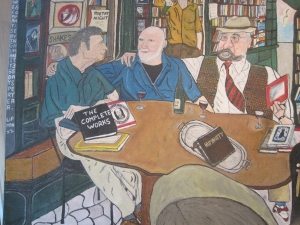In Shakespeare & Company, the famous bookstore in Paris, I saw a sign on the wall, on which is written some words by Anais Nin, a French author famous for 60 years’ worth of journals, Nin wrote: “We write to taste life twice.”
That is what my siblings and I did every Monday morning by phone for about a year. I called my sister in New York and she conferenced in my brother in Massachusetts. We picked a topic about our past, recalled related memories and then discussed our recollections. I tape recorded our talks, had them transcribed and we then developed and edited these stories in preparation for a full length memoir.
In recalling incidents: times, places and people of our lives, one of us might have come up with a piece of an incident and the others filled in. It was often hilarious, sometimes embarrassing, mostly heartwarming and occasionally disarming.
Such as one day—we gave ourselves a tricky challenge in recalling growing up with our sister who died nearly two decades earlier. She was our oldest sister, and, especially regards my brother, she played the role of a practical joker and tease. She so enriched our lives with a parade of children, grandchildren, friends, mentors and teachers whom she shared with us, and our memories brought laughter, admiration and some tears. It was both an honoring of her and an unflinching look at foibles and flaws in all of us that made some of our interactions with each other sometimes regrettable.
What I realized from our sharing stories was that writing about your past is not only a way to relive it, but also a way to detach from it. It is a way to remember, savor and also forgive—self and others. As I expressed various feelings and thoughts about our deceased sister that day, my other two siblings shed light on the times and events from their older perspectives and upon our unique family dynamics. I felt a weight lifting and discovered they did as well.
When one talks or writes about the past in detail, it comes into focus, rich with perception, texture and color. But then, like pictures in an album, they remain part of another time and place. You look, experience the richness of the moments and yet you can achieve detachment. For you are here now; the present begs you to create new memories, new life.
It is different writing as a group. When one writes his memoir by himself, a freedom is gained, for sure. But in a group, remembering and sharing perspectives and ideas about the past is rewarded with closeness of community, individual empowerment and freedom.
A published book—even if only to family and friends—goes a step further. It gives the writer(s) an enriched future, as it reaches out to future readers. A new motto for Shakespeare & Company could be: “We write our past to learn about, embrace, then free ourselves from it—gaining more present and a greater ability to create future.”







